For most people, MetaMask is the crypto wallet. It’s the first extension they install when exploring DeFi, the go-to option for minting NFTs, and the default gateway into Ethereum. It’s been around since 2016, and for better or worse, it’s become part of the Web3 furniture.
But just because it’s the most popular wallet doesn’t mean it’s the best fit for everyone. In fact, MetaMask’s strength lies in being a reliable generalist—it does many things decently but doesn’t excel at any one feature. If you're after best-in-class UX, native multi-chain support, or built-in security enhancements like 2FA or phishing firewalls, there are better options on the table today.
As the crypto ecosystem matures, so do user expectations. Wallets aren’t just key managers anymore—they’re product ecosystems. And that’s precisely why it’s worth considering a MetaMask alternative.
Key Takeaways
- The top MetaMask alternatives are Trust Wallet, Coinbase Wallet, Exodus, Ledger, Trezor, Rabby Wallet, and Zengo—each offering unique advantages for different crypto users.
- Rabby stands out for its seamless multi-chain DApp access and pre-transaction risk scanning—ideal for DeFi power users.
- Trust Wallet and Coinbase Wallet offer great mobile UX, NFT support, and Solana compatibility, making them strong all-rounders for casual and active users alike.
- Exodus delivers a visually polished experience on desktop and mobile, with Trezor hardware integration for added security.
- Ledger and Trezor remain top-tier for cold storage security, appealing to long-term holders and security-maximalists.
- Zengo eliminates seed phrases via MPC and offers 3FA and biometric signing, making it ideal for users seeking mobile-first security with no key management stress.
- When choosing a wallet, consider your core priorities: security, device preference, chain compatibility, and how actively you engage with DApps or NFTs.
- Migrating from MetaMask is simple: export your seed or private key and import it into your new wallet—just double-check compatibility for all your tokens.
Why Look for MetaMask Alternatives
MetaMask hasn’t aged poorly—it just hasn’t aged fast enough. While it still dominates regarding DApp compatibility and network reach across EVM chains, its user experience and feature set lag behind newer wallets built with today’s crypto landscape in mind.
The UX, particularly on the browser extension, feels dated. Token discovery often requires manual input, and NFT previews are inconsistent. In contrast, other wallets offer cleaner interfaces, default support for major networks, and far better token visibility out of the box.
Security is another weak spot. MetaMask lacks native two-factor authentication (2FA), making it more vulnerable than wallets that support biometric signing, MFA, or hardware-isolated key management. While it does support hardware wallets like Ledger and Trezor, it’s not built around advanced security models like MPC (used by Zengo) or air-gapping (like SafePal).
The wallet’s in-app swap feature also comes with a 0.875% fee, steep compared to 0–0.3% offered by aggregators like 1inch or Matcha. While convenient, it’s hardly cost-efficient.
To its credit, MetaMask is evolving. It’s rolling out native Bitcoin and Solana support, redesigning its mobile UI, and introducing smart accounts with gas abstraction. However, some of these upgrades are still on the roadmap, and other wallets have already built them into their core experience.
For an in-depth analysis of MetaMask's features and security enhancements, check out Coin Bureau's comprehensive review.
Key Features to Look for in a MetaMask Alternative
Choosing a MetaMask alternative isn’t just about switching wallets—it’s about finding one that better aligns with your usage, priorities, and security preferences.
 MetaMask Is Undergoing A Major Overhaul | Image via Metamask
MetaMask Is Undergoing A Major Overhaul | Image via MetamaskHere are the core features worth evaluating:
- Security First: Look for non-custodial wallets that support hardware integration (e.g., Ledger, Trezor), two-factor authentication, or seedless recovery like Zengo’s MPC setup. Advanced security options like transaction previews, biometric signing, and phishing warnings (offered by Rabby and Zengo) can add meaningful protection.
- Chain Compatibility: While MetaMask supports most EVM chains, alternatives like Rabby handle 140+ EVM networks with auto-switching, and wallets like Coinbase Wallet and Trust Wallet also support Solana and other non-EVM ecosystems.
- UX & Accessibility: Mobile-first options like Zengo and Trust Wallet are great for on-the-go users, while browser-based wallets like Rabby and Exodus offer smoother desktop experiences. Some wallets like Ledger and Trezor prioritize cold storage, while others focus on day-to-day usability.
- DeFi & NFT Integration: If you’re active in DeFi or NFTs, make sure your wallet supports in-app staking, swaps, or NFT galleries—Trust Wallet, Exodus, and Stax do this well.
- Open-Source Transparency: Wallets like Trezor, Rabby, and Coinbase Wallet have open-source codebases, allowing for third-party auditing and stronger community trust.
The ultimate MetaMask alternative is one that balances security, usability, and compatibility with the chains and tools you actually use.
Top MetaMask Alternatives in 2025
Here is a TL;DR version of the MetaMask alternatives we're about to cover subsequently, condensed in a table:
| Wallet | Platforms | Chain Support | Security Model | 2FA / Biometric | NFT & dApp Support | Best For |
|---|---|---|---|---|---|---|
| Trust Wallet | Mobile, Browser | 100+ chains incl. Solana | Local key storage (non-custodial) | Biometric only | Built-in dApp browser, NFTs | Mobile-first beginners |
| Coinbase Wallet | Mobile, Browser | EVM + Solana | Secure Enclave + MFA | MFA + Biometric | NFTs, DeFi, Ledger integration | Coinbase users & mobile UX seekers |
| Exodus | Desktop, Mobile, Browser | 200+ assets (via partners) | Local key storage + Trezor option | Biometric only | Built-in NFT gallery, swaps | Design-focused desktop/mobile users |
| Ledger Wallets | Hardware Only | 5,500+ assets (via Ledger Live) | Cold storage w/ Secure Element | 2FA via Ledger Security Key | NFT & DeFi via Ledger Live | Security-maximalists & long-term holders |
| Trezor Wallets | Hardware Only | Thousands of assets | Cold storage, Open-source | PIN + Passphrase | NFT (via 3rd party tools) | Transparency-focused cold storage users |
| Rabby Wallet | Browser Extension | 140+ EVM chains | Local key storage + TX simulation | No native 2FA | Auto chain-switch, DApp risk alerts | Multi-chain DeFi & dApp power users |
| Zengo Wallet | Mobile Only | Ethereum, Polygon, swaps | MPC (seedless, 3FA secured) | 3FA + Biometric | NFTs, WalletConnect | Seedless security & mobile simplicity |
Trust Wallet
Trust Wallet is a beginner-friendly, mobile-first crypto wallet built for versatility. Acquired by Binance in 2018, it supports a wide range of blockchains and tokens, making it one of the most accessible wallets for users who want to explore multiple ecosystems from their phone. While originally mobile-only, it now also offers a browser extension for Chrome, Brave, and Opera.
 Trust Wallet Interface and Setup | Image via Community Site
Trust Wallet Interface and Setup | Image via Community Site The wallet supports over 10 million assets across 100+ blockchains—including Bitcoin, Ethereum, Solana, and most major altcoins. It also offers native staking for select tokens, an integrated NFT gallery, and a built-in Web3 browser that lets users interact directly with DApps and blockchain games.
Security: Trust Wallet is non-custodial, meaning users hold their private keys, which are stored locally on-device. Security is further enhanced through encrypted key storage and optional biometric access. However, it lacks native two-factor authentication (2FA), which may be a drawback for more security-conscious users.
✅ Pros
- Huge token and chain support.
- Simple, intuitive mobile interface.
- Built-in DApp browser, staking, and NFT support.
- Open-source code for transparency.
❌ Cons
- No 2FA or advanced security features.
- Still lacks a full desktop app (browser extension only).
Trust Wallet is ideal for mobile-first users who want broad asset coverage and access to DApps in a simple, self-custodial setup. It’s especially appealing to beginners who want a one-stop wallet for trading, staking, and NFTs without needing a desktop.
Coinbase Wallet
Coinbase Wallet is a non-custodial crypto wallet designed for users who want to manage digital assets directly on-chain, without relying on Coinbase’s centralized exchange. While it's built by Coinbase, the wallet operates independently, giving users full control over their private keys.
It supports various assets across EVM chains and Solana, with native access to DeFi platforms, NFT marketplaces, and DApps. The interface is sleek, beginner-friendly, and backed by Coinbase’s reputation for regulatory-grade security practices. Users can switch between mobile and browser extension, making it a flexible choice for those who want convenience with control.
We also have an article dedicated to comparing Coinbase Wallet and MetaMask.
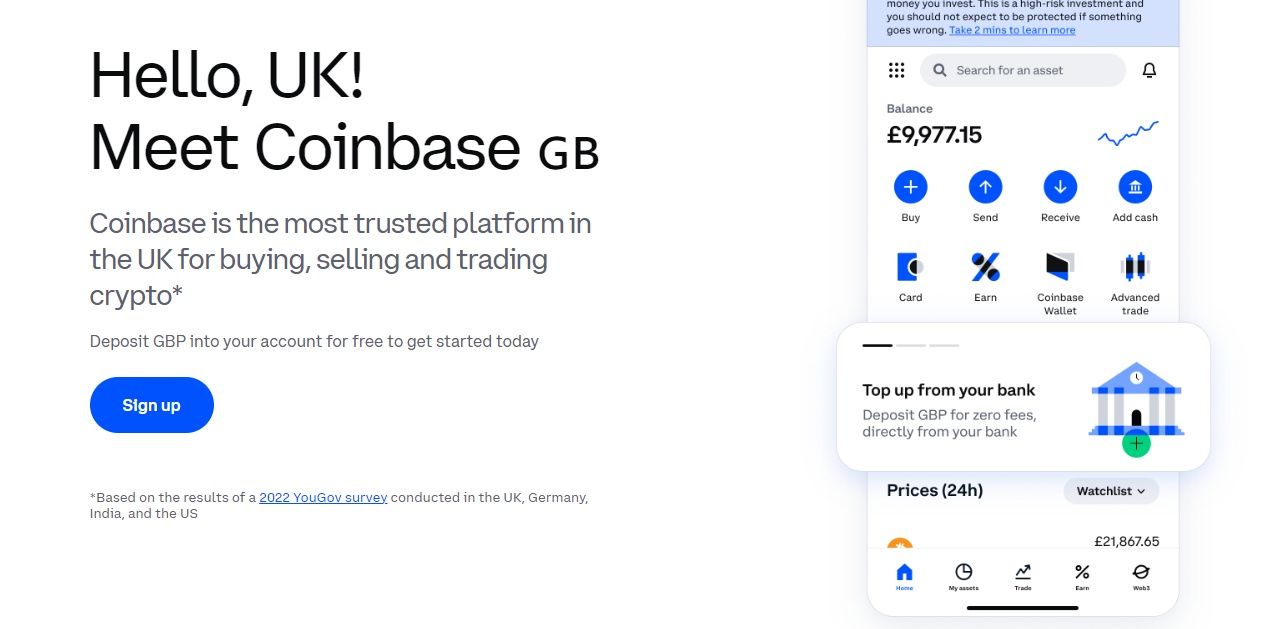 Embracing a Remote-First Model, Coinbase Reflects the Decentralized Spirit of Blockchain. Image via Coinbase
Embracing a Remote-First Model, Coinbase Reflects the Decentralized Spirit of Blockchain. Image via CoinbaseSecurity: Private keys are stored locally on the user’s device and protected with industry-standard encryption. Additional safeguards include biometric authentication (Face ID or fingerprint), Secure Enclave hardware support on compatible devices, and optional encrypted cloud backups (Google Drive/iCloud). It also supports multi-factor authentication and can be paired with Ledger hardware wallets for added protection.
✅ Pros
- Non-custodial with full private key control.
- Supports EVM + Solana chains.
- Biometric login + MFA for better security.
- Easy connection to Coinbase Exchange.
- Free to use, no subscription fees.
❌ Cons
- No multi-signature support.
- Limited staking options (mostly Ethereum).
- No desktop app; browser/mobile only.
- Cloud backups may concern privacy purists.
Coinbase Wallet is best suited for beginners or Coinbase users seeking a secure, mobile-friendly wallet that bridges self-custody with DeFi access. Its UI and security blend make it an easy transition for those new to Web3.
Exodus Wallet
Exodus is a multi-platform, non-custodial crypto wallet known for its sleek design and beginner-friendly experience. It supports desktop (Windows, macOS, Linux), mobile (iOS, Android), and a browser extension, offering broad accessibility without compromising on functionality.
The wallet supports hundreds of cryptocurrencies and includes a built-in exchange that lets users swap assets directly within the app. Visual portfolio tracking tools provide real-time performance insights, while NFT support—primarily for Solana assets—adds another layer of utility. For users seeking stronger protection, Exodus integrates seamlessly with Trezor hardware wallets.
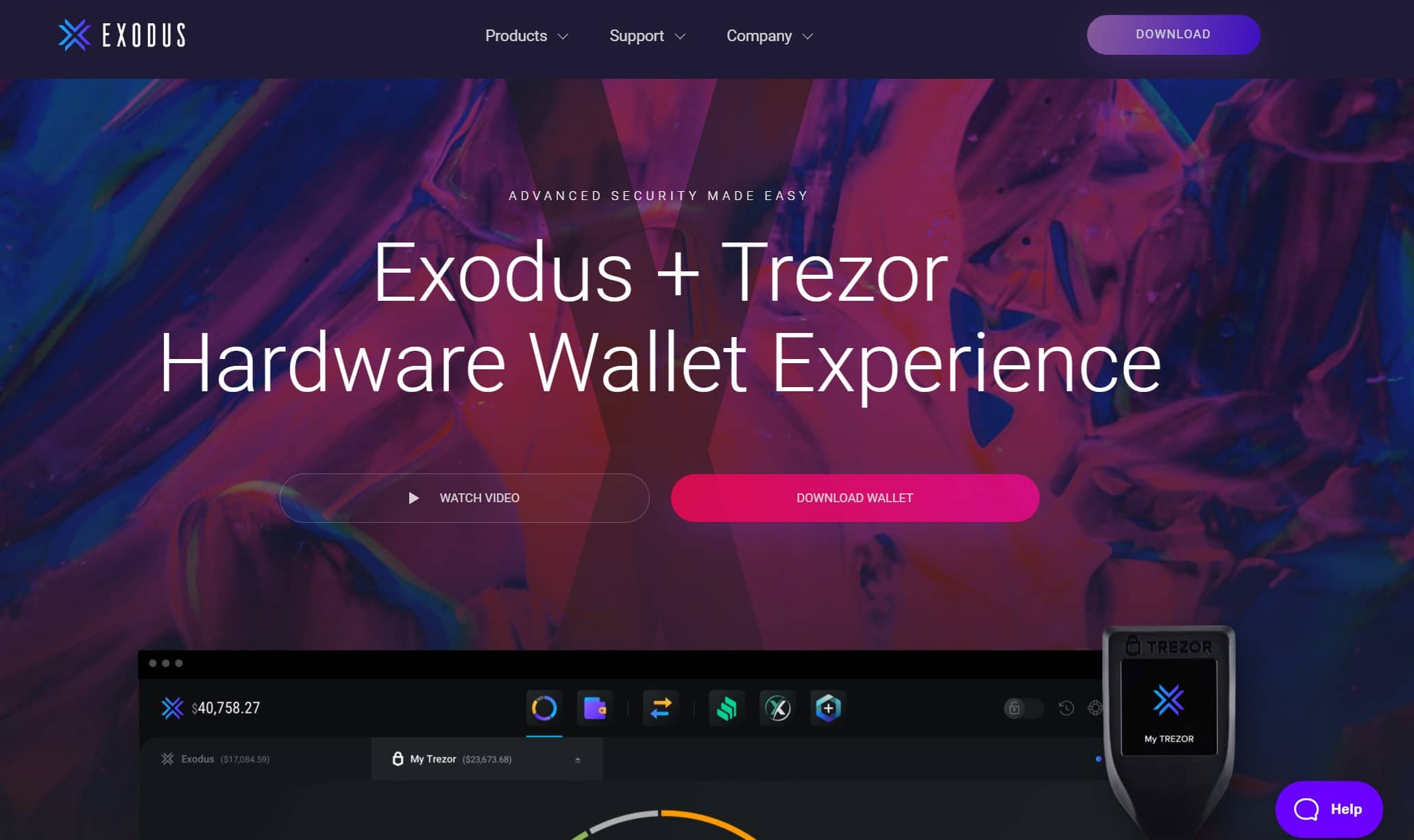 Exodus + Trezor Integration for Additional Security | Image via Exodus
Exodus + Trezor Integration for Additional Security | Image via Exodus Security: Exodus encrypts and stores private keys locally on the user’s device, giving the user full control. Biometric login and password protection are available, and regular updates help patch vulnerabilities. While some components are open-source, the full codebase is not. It also lacks native two-factor authentication (2FA), which may concern more advanced users. Still, integration with Trezor provides an option for cold storage security.
✅ Pros
- Clean, intuitive interface ideal for beginners.
- Available across desktop, mobile, and browser.
- Built-in exchange and portfolio tracking.
- Trezor hardware wallet support.
- No KYC required.
❌ Cons
- No native 2FA support.
- Not fully open-source.
Exodus is best for users who value design, ease of use, and multi-device flexibility. It’s an excellent choice for those who want an all-in-one wallet to hold, trade, and track assets, especially when paired with a Trezor for enhanced security.
Ledger Wallets
Ledger is one of the most trusted names in hardware wallets, widely known for delivering high-security cold storage solutions. The current lineup includes three standout models—Nano S Plus, Flex, and Stax—each tailored to different needs but built on the same security foundation. All Ledger wallets are non-custodial and integrate with the Ledger Live app, enabling secure access to crypto, NFTs, and DeFi tools across desktop and mobile.
The Nano S Plus is a budget-friendly option with USB-C connectivity, a simple button interface, and support for 5,500+ assets. The Flex adds Bluetooth, NFC, and a 2.84" E-Ink touchscreen, offering a smooth mobile experience. Stax goes further with a curved, always-on E-Ink display, wireless charging, and multi-sig support for power users.
Read our comparison between the three Ledger wallets to find the right one for you.
 Nano S Plus Design | Image via Twitter
Nano S Plus Design | Image via TwitterSecurity: All three models feature CC EAL-certified Secure Element chips and run Ledger’s proprietary BOLOS OS. Users confirm all transactions on-device, and keys never leave the hardware. Flex and Stax include optional 2FA via the Ledger Security Key app and support for Ledger Recover backup. Stax also adds a Protection Mode and multi-sig functionality for advanced users.
✅ Pros
- Cold storage security with offline key isolation.
- Ledger Live integration for NFTs, DeFi, and staking.
- Flexible UX: from wired basic (Nano) to premium wireless (Stax).
- Open compatibility with MetaMask, Coinbase Wallet, and more.
❌ Cons
- No free version; entry starts at $79.
- UX varies—Nano S Plus lacks wireless and touch features.
Ledger wallets are ideal for users seeking maximum security, with models ranging from minimalist cold storage to premium touchscreen vaults.
Trezor Wallets
Trezor is the original name in hardware wallets. It was launched in 2014, pioneered cold storage for Bitcoin, and remains a favorite for users who value transparency and self-custody. Its current lineup includes the Trezor One, Model T, Safe 3, and Safe 5, the latest flagship. All Trezor wallets are non-custodial and open-source, offering full control of private keys and publicly auditable firmware.
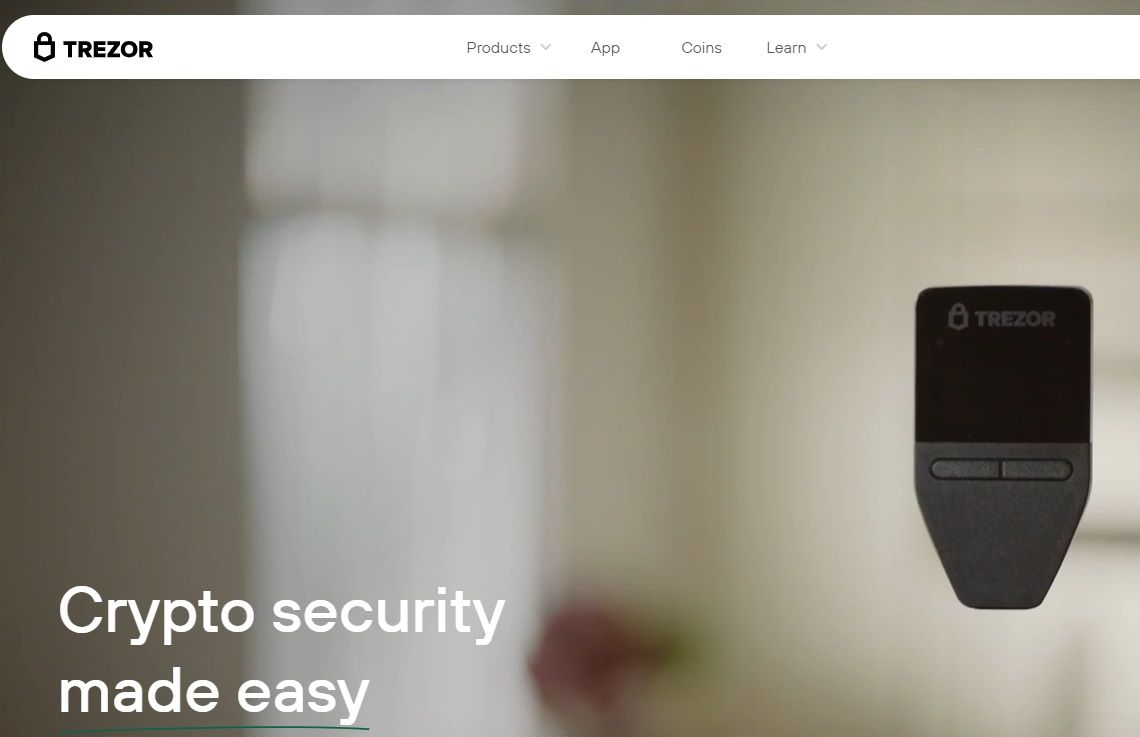 Trezor is the Founder of the Hardware Wallet Market | Image via Trezor
Trezor is the Founder of the Hardware Wallet Market | Image via TrezorTrezor wallets support thousands of cryptocurrencies and integrate with the Trezor Suite desktop app, allowing users to manage, send, receive, and even Coinjoin assets for privacy. Touchscreen options are available on the Model T and Safe 5, while Trezor One and Safe 3 offer simpler, button-based navigation.
Security: The Safe 3 and Safe 5 models include EAL6+ certified Secure Elements for added hardware-based protection. All Trezor wallets enforce PIN-based access, 12/24-word seed phrases, and on-device transaction confirmation. The Safe 5 also introduces a 20-word backup format, optional Shamir Backup (splitting seed phrases), and MicroSD encryption support. Trezor wallets lack Bluetooth or wireless features, appealing to users who prefer air-gapped simplicity.
✅ Pros
- Open-source and community-audited.
- Longstanding reputation with no major exploits.
- Coinjoin support and FIDO2 authentication (Safe 5).
- Multi-platform access (USB-C).
❌ Cons
- No wireless or Bluetooth connectivity.
- NFT support often requires third-party tools.
- Trezor One still uses micro USB.
Trezor wallets are ideal for users who value security, transparency, and hardware simplicity. The Safe 5 is especially well-suited for advanced users who want Secure Element protection, advanced backup options, and FIDO2 authentication in a sleek, modern device.
Rabby Wallet
Rabby Wallet is a non-custodial, open-source browser extension developed by DeBank, designed to enhance the Web3 experience with a focus on multi-chain support and security. It supports over 140 EVM-compatible networks, including Ethereum, Polygon, BNB Chain, and Arbitrum, allowing users to manage assets across multiple chains seamlessly.
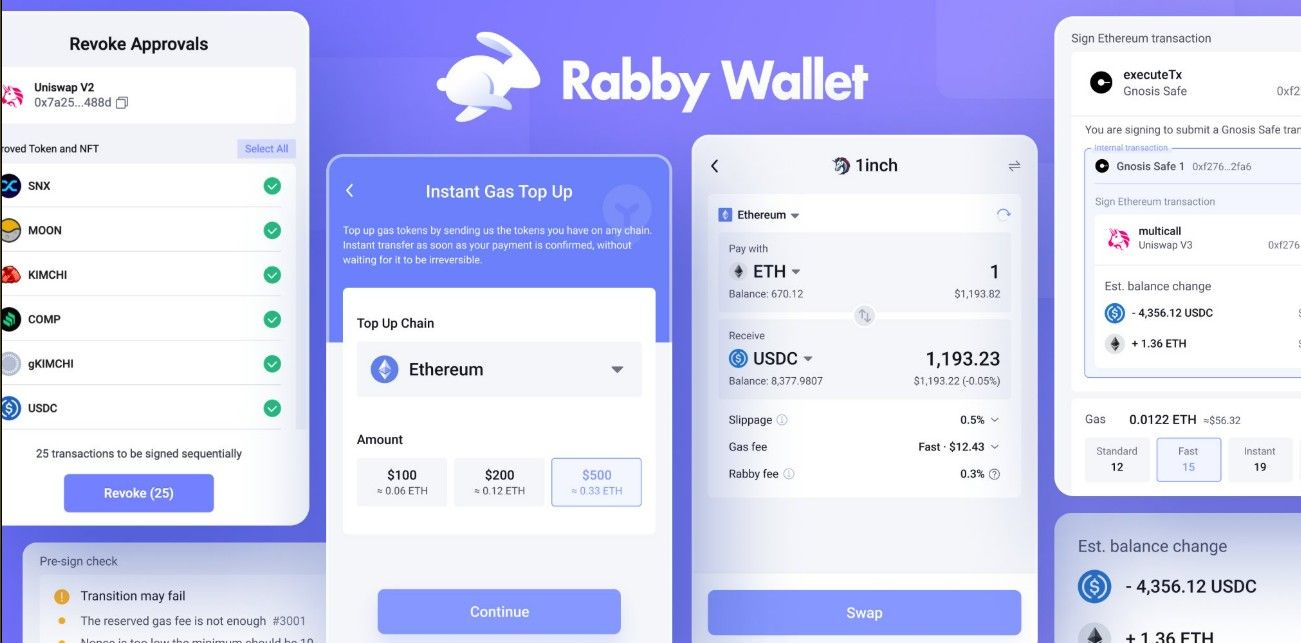 Rabby Wallet Interface | Image via X
Rabby Wallet Interface | Image via XOne of Rabby's standout features is its automatic network switching, which detects and connects to the appropriate blockchain based on the DApp being used, eliminating manual chain selection. The wallet also offers in-app token swaps through integrations with platforms like 1inch and ParaSwap, and a Gas Top-Up feature that enables users to purchase gas tokens across networks without leaving the wallet.
Security: Rabby emphasizes security with features such as transaction previews that display estimated balance changes before signing, pre-transaction risk scanning to identify potential threats, and security alerts for suspicious activities. It also supports hardware wallet integrations, including Ledger and Trezor, for enhanced security.
✅ Pros
- Supports over 140 EVM-compatible networks.
- Automatic network detection and switching.
- Advanced security features like transaction previews and risk alerts.
- Integration with hardware wallets.
- In-app token swaps and gas top-ups.
❌ Cons
- No support for non-EVM chains like Solana or Bitcoin.
- Mobile app functionality is limited compared to the browser extension.
- Lacks staking and fiat on-ramp features.
Rabby Wallet is ideal for DeFi users who operate across multiple EVM chains and prioritize security. Its intuitive interface and advanced features make it a strong alternative for those seeking more than what traditional wallets like MetaMask offer.
Zengo Wallet
Zengo Wallet is a mobile-first, non-custodial wallet that rethinks crypto security by eliminating seed phrases entirely. Instead of relying on a single private key, Zengo uses Multi-Party Computation (MPC) to split control between two encrypted “secret shares”—one stored on your device, the other on Zengo’s secure servers. This architecture ensures that no single point of failure exists, while still giving users full custody.
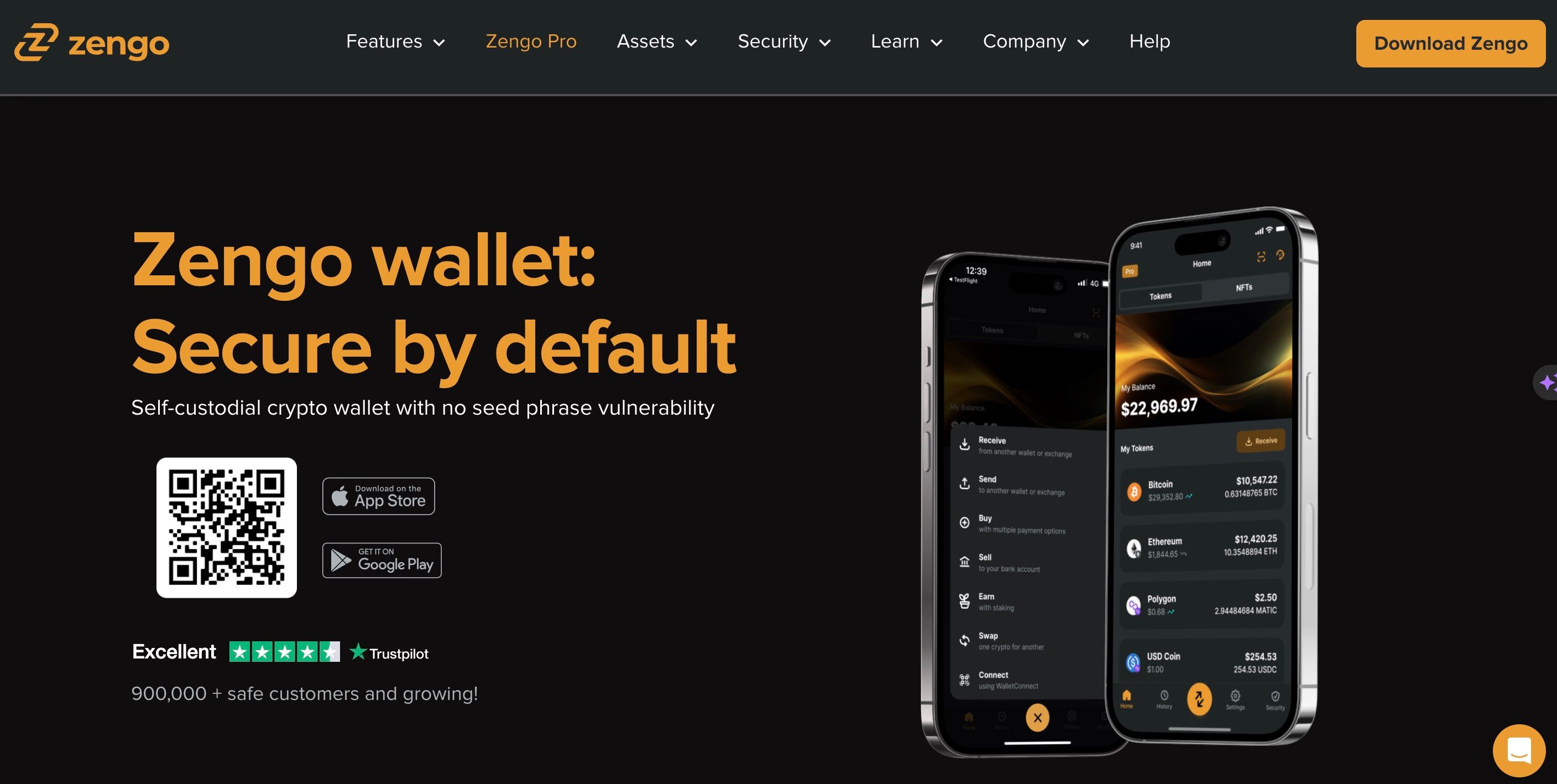 Zengo Wallet Homepage | Image via Zengo
Zengo Wallet Homepage | Image via ZengoZengo supports a range of assets across Ethereum and Polygon, with cross-chain swaps available via Changelly. The app offers built-in NFT support, ENS integration, a fiat on/off-ramp, and 24/7 live customer support. Its Web3 Firewall gives each DApp interaction a real-time trust rating, helping users spot risky transactions before signing.
Security
Zengo’s security stack includes 3-Factor Authentication (3FA)—combining biometric verification (3D FaceLock), device-level secure enclaves, and encrypted cloud backups. It also features biometric transaction signing, an escrow-based guaranteed recovery plan, and zero history of hacks since launch in 2019. However, it does not allow private key exports—a deliberate design trade-off for security.
✅ Pros
- No seed phrase to lose or compromise.
- MPC eliminates single point of failure.
- Biometric + 3FA recovery system.
- Built-in NFT and spam filtering.
- Excellent UI, educational content, and live support.
❌ Cons
- No private key export.
- DApp access only via WalletConnect.
- In-app fees can be high (up to 3.75%).
- Pro features require a paid subscription.
Zengo is ideal for users who prioritize ease of use, mobile security, and seedless recovery. It's especially suited for newcomers or those looking to pair an MPC wallet with a traditional hardware or key-based solution.
How to Choose the Right Wallet for You
The right wallet depends on how—and where—you interact with crypto. Start by identifying your core needs:
- Main Blockchain(s): If you're focused on EVM chains like Ethereum, Arbitrum, or BSC, wallets like Rabby, Ledger, and Coinbase Wallet offer deep integration. For broader support, including Solana, Trust Wallet, and Coinbase Wallet, are better choices.
- Mobile vs Desktop: Prefer mobile? Zengo, Trust Wallet, and Coinbase Wallet offer full-featured apps. For browser-based workflows, Rabby, Exodus, and Ledger Live are ideal.
- Security vs Convenience: For cold storage, Ledger and Trezor are top picks. If you want secure convenience, Zengo offers biometric protection and seedless recovery without sacrificing control.
- Open-Source & Community: Trezor, Rabby, and Coinbase Wallet maintain open-source codebases and strong community engagement, which is great for users who value transparency.
- DApp Compatibility: Rabby leads with seamless multi-chain DApp support and pre-transaction security scans. Trust Wallet, Coinbase Wallet, and Exodus also provide strong DApp integration.
Migrating from MetaMask
Switching wallets doesn’t mean abandoning your assets. Here’s how to migrate safely:
- Export your MetaMask private key or seed phrase (from Settings → Security & Privacy).
- Import that key or phrase into your new wallet—most alternatives support this step.
- Verify your balances and re-add custom tokens if needed.
- Reconnect your new wallet to DApps and update permissions on tools like Etherscan or DeBank.
- Revoke old approvals on MetaMask if you’re moving funds permanently.
With a few simple steps, you can move to a wallet that better matches your crypto habits, without losing access to your funds.
Final Thoughts: Moving Beyond MetaMask
MetaMask may still be the most widely used crypto wallet, but it's no longer the only serious option. As crypto evolves, so do user expectations. Whether you’re looking for better security, multi-chain support, mobile convenience, or hardware-level protection, a MetaMask alternative will likely fit your needs better.
We’ve explored a diverse mix—from hardware wallets like Ledger and Trezor, to mobile-first apps like Zengo and Trust Wallet, to DeFi-native tools like Rabby and Coinbase Wallet. Each offers a unique balance of features that caters to different use cases—from NFT collectors and traders to long-term holders and privacy-maximalists.





